Muungano youth share their role as knowledge brokers driving change in informal settlements
Muungano youth share their role as knowledge brokers driving change in informal settlements
Young people are often the first responders to climate and social challenges in their communities, and this is especially true for Muungano wa Wanavijiji Youth. Living in informal settlements where issues of land, housing, and access to basic services are deeply connected to climate vulnerability, Muungano youth are often the hardest hit by disasters like floods. In response, they have stepped into leadership roles, organising their communities, conducting research, documenting impact stories, and using creative arts for advocacy. With over 18,000 members across Kenya, they are continuing the legacy of past federation leaders by mobilising action today to shape a more resilient future. Supported by SDI Kenya, an affiliate of the global Slum Dwellers International network, Muungano wa Wanavijiji has been working since 1996 to improve the quality of life for slum dwellers through daily savings, community mapping, peer-learning, and inclusive urban planning—advocating for secure tenure, adequate housing, and essential services for all.
Knowledge brokering learning workshop
In February 2025, 28 Muungano youth participated in a knowledge brokering learning workshop to increase their understanding of the concept, tools, strategies, and approaches they could apply in their current and future work to have a greater impact in their communities. A dynamic, peer learning environment was set up to enable participants to learn from each other and identify potential areas of collaboration and synergy.
At its core, knowledge brokering is about moving knowledge into action. It involves linking knowledge producers and users to facilitate creating, sharing, and applying critical insights. Knowledge brokers’ responsibilities range from synthesising complex information to make it more accessible to convening diverse stakeholders and driving systemic change. Knowledge brokering is essential for youth in informal settlements to ensure that lived experiences and local expertise inform climate adaptation and resilience efforts.
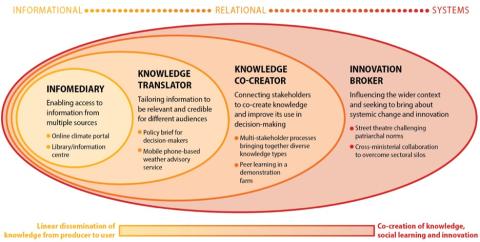
The workshop brought together a diverse group of youth leaders to ensure meaningful engagement and impact based on a carefully considered selection process. The youth participants represented a mix of communities, including Kibera, Mukuru, and Mathare, reflecting the varied experiences of informal settlements. They also came from different SDI Kenya and Muungano projects and initiatives, such as Race to Resilience, Voices for Just Climate Action, Mukuru Special Planning Area (SPA), Youth Power, and Know Your City TV (KYC.TV). This aided the immediate application of knowledge, peer-to-peer learning, cross-pollination of ideas and strategies, and broader knowledge dissemination within their networks.
Beyond location and project affiliation diversity, the workshop prioritised a mix of expertise and roles. Attendees included community health promoters, creatives, core researchers, and community champions involved in adaptation planning, each bringing unique skills and perspectives to the conversation.
A key objective was also to expand the youth movement by promoting collaboration between individuals who had not previously worked together. This meant that youths who belong to different groups could network with their counterparts from other groups, enhancing collective impact.
Emerging lessons:
The youth shared many valuable insights based on their experiences and reflections.
- Muungano Youth learnt that structured plans with clear roles, directions, and responsibilities make community engagement and organisation more effective.
- Key stakeholders, including community members and project participants, should be involved in the entire planning process. Communities have solutions to issues affecting them; ensuring that planning and implementation are participatory ensures that people don't resist a project, which is key for sustainability, relevance, ownership, and long-term success.
- Engaging partners and government stakeholders from the beginning strengthens support, resource mobilisation, policy alignment, and critical support.
- To ensure meaningful participation and ownership in community organising and advocacy processes, team members should have a holistic understanding and be engaged in the whole process at multiple levels (not just within their specific roles, e.g., data collection, writing, communications).
- Strong facilitation skills, which need to be continuously updated, are required to effectively share knowledge and engage diverse stakeholders.
- Despite complex terminology, Muungano youth recognised they already act as knowledge brokers.
“I realised that the different activities and roles that are outlined in the knowledge brokering spectrum are all interconnected and that Muungano members are knowledge brokers throughout, despite what can sometimes be considered complex terminology that describes that.” Kamila Gojobe; Muungano youth leader.
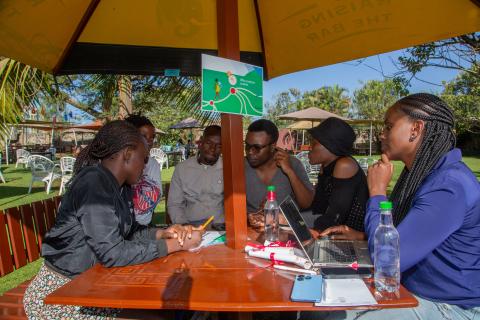
Key takeaways from the workshop
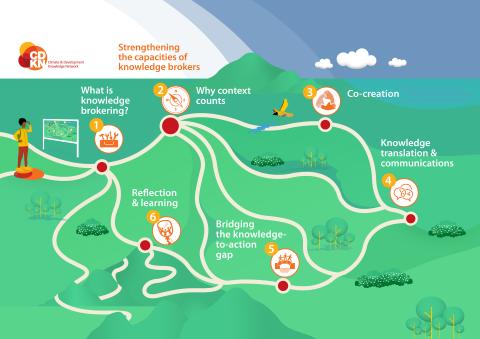
Understanding context
One of the key takeaways from the workshop was the importance of understanding the broader context in which knowledge brokering takes place. Muungano youth recognised that effective knowledge sharing requires a deep awareness of the environment, stakeholders, and power dynamics. During the workshop, Muungano Youth reflected on why communities in informal settlements struggle to access critical climate-related information. This can be due to various factors, including limited digital access, restrictive policies, economic barriers, or exclusion from decision-making spaces.
Here are some of the key lessons learned:
- The effectiveness of knowledge brokering depends on understanding the social, political, and environmental factors in informal settlements.
- When conducting stakeholder mapping and analysis, it is not enough to list broad categories like ‘NGOs’ or ‘CBOs.’ Instead, pinpointing specific organisations working in the geographical area and their expertise, influence, and interest in the issue will help identify critical or potential allies.
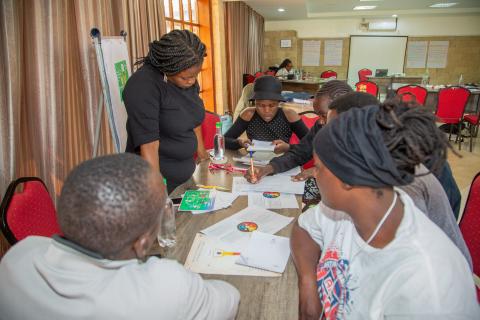
Co-creation
Another key takeaway from the workshop was the importance of co-creation. Muungano youth reaffirmed that for knowledge-sharing activities to be impactful, they must be community-owned and inclusive to ensure that diverse perspectives shape solutions and that knowledge moves beyond discussion into action. Here are some insights they gained:
- Activities should be designed and implemented to ensure full community participation, where every voice and perspective truly matters.
- The group learned different approaches to create safe peer learning environments where everyone can participate and share their opinion, either in small groups or in plenary, using tools that ensure everyone’s voice is heard (e.g. the Time to Think technique where everyone in a circle shares their idea for an allocated set of time).
- The importance of closing the feedback loop in research. This is because information is often brought to the community, but there is no clear discussion about what happens next, including specific steps, how the information will be used, etc. The youth recognised the need for clear follow-up mechanisms to ensure research insights translate into actionable outcomes.
- Experiential learning games and tools help facilitate conversations, break the ice, and consolidate the learning. For example, a treasure hunt was designed for the last workshop morning to revisit a few of the key tools and allow for deeper exploration of some of the content covered in the workshop. One of the participants reflected that it provided them with a community organiser roadmap they would be able to use in future. The Timescapes x3 reflection tool also helped set a clear direction with intermediate milestones and activities to work toward.
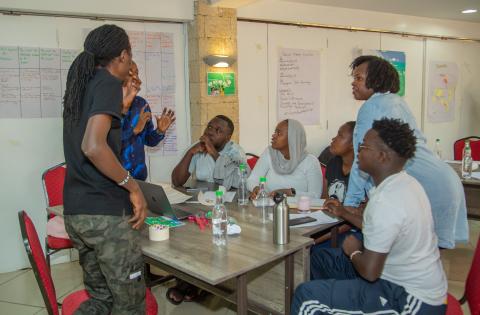
Knowledge translation
Muungano Youth critically reflected on how knowledge is communicated and translated in their communities. They questioned existing practices and explored ways to enhance knowledge-sharing strategies to make them more impactful, inclusive, and action-oriented. Key takeaways included:
- Participants questioned the current approach of Know Your City TV, emphasising the need to rethink its objectives, clarify target audiences (considering factors such as internet access), and integrate more co-creation in content development. They identified gaps in the pre- and post-production process, highlighting the need for stakeholder feedback, a structured learning lens for evaluation, and clearer messaging strategies.
- Participants realised the need to rethink how information is disseminated to communities and which communication channels are used beyond social media. Seeing the wealth of talent showcased in the workshop, including spoken word, acting, art, poetry, and photo/video skills, they expressed a desire to expand the use of the arts in knowledge dissemination and advocacy. The workshop also highlighted the importance of using creative and interactive communication methods in community sessions, reinforcing the idea that people learn differently.
- The youth recognised that murals widely used for advocacy should have a more defined audience and messaging strategy. They emphasised the need for an inclusive co-creation process that ensures messages are clear, impactful, and community-driven.
- They acknowledged that communications outputs (such as videos, murals, or reports) should not be seen as an end in themselves but as tools to spark conversations. It is essential to create spaces where community members can engage with these materials, discuss their relevance, and bridge the gap between knowledge and action.
- Participants committed to disseminating what they learned about knowledge brokering within their groups and networks. They identified key factors that would enhance knowledge translation, including: Using clear, accessible language, Leveraging arts and creativity to make knowledge engaging and incorporating interactive tools like the “All Hands on Deck” card game to facilitate participatory knowledge-sharing.
Looking forward
The workshop exposed youth to effective knowledge brokering strategies they can use immediately in different initiatives, projects, and programmes. They could exchange insights and experiences with their peers who are involved in different activities and from different informal settlements.
“The workshop was very timely because we appreciate the fact that as time goes, knowledge sharing strategies keep changing and critical skills are now more than ever needed by change agents engaged in dealing with complex climate and social issues such as Muungano youth, hence the need to keep learning what works best in the youth’s context.” Suleiman Kimani, Communications Intern, SDI Kenya.
Through deep reflective discussions, the youth shared their experiences, including the successes and challenges they face as change agents in their communities. They are now equipped with new knowledge and strengthened networks and are better positioned to drive impactful, community-led solutions that bridge the gap between information and action.
